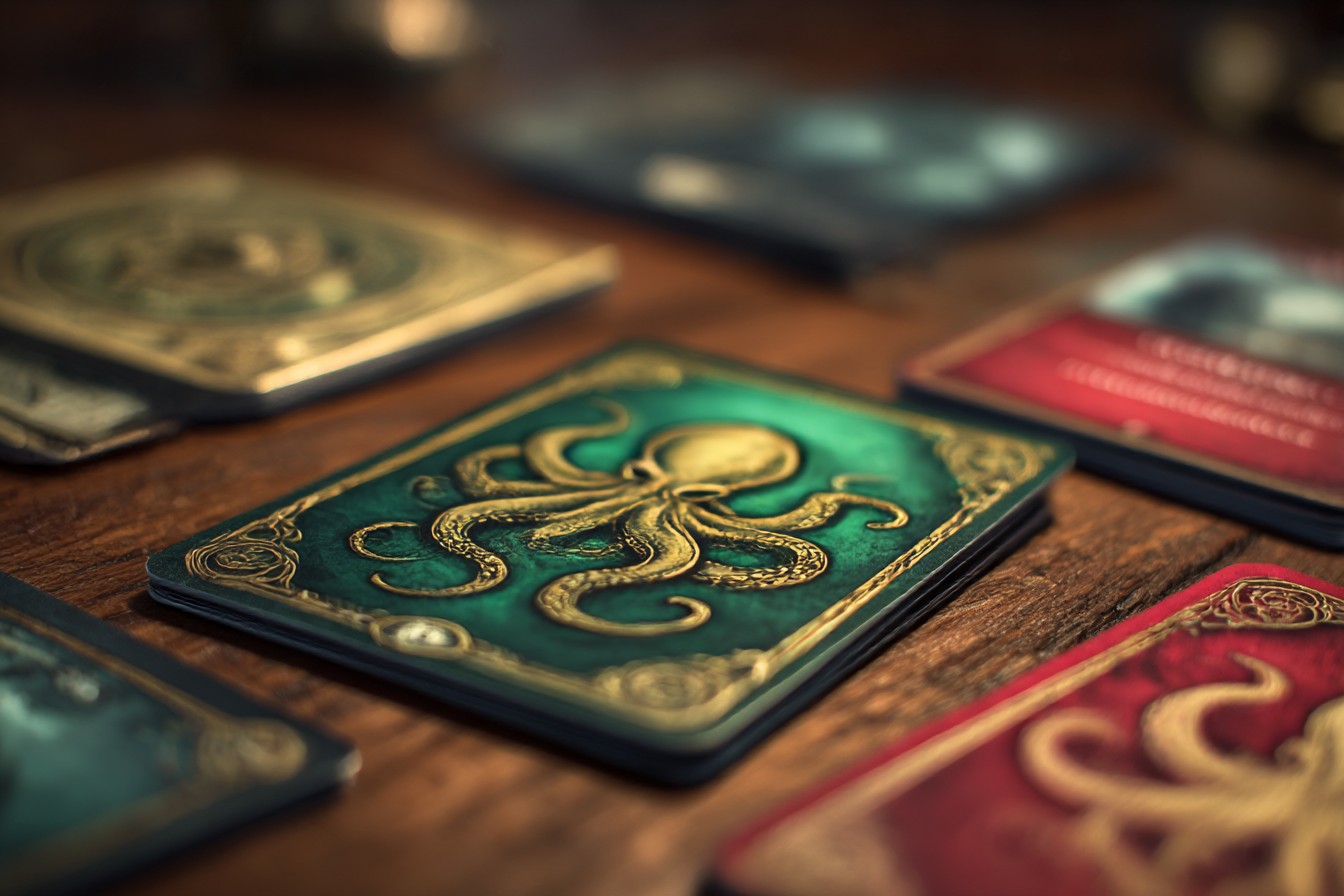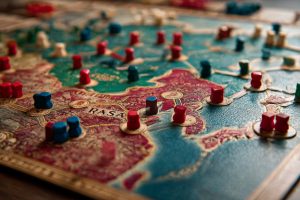Okay, so I have to confess something that might hurt my credibility as someone who supposedly knows what she’s doing with games – the Arkham Horror Card Game absolutely destroyed my confidence for like six months straight. I mean, I’m used to party games where the worst thing that happens is someone draws an awkward Cards Against Humanity card, but this? This was a whole different beast.
It started when my friend Marcus brought over The Innsmouth Conspiracy campaign last spring. He’d been trying to get our game night group into more serious board games, and honestly, I was skeptical. We’re talking about people who consider Codenames intellectually challenging on a good day. But Marcus insisted this would be different – more like collaborative storytelling, he said. Interactive horror movie, he said. Fun for everyone, he said.
Well, Marcus was both completely right and completely wrong.
Our first attempt was… let’s call it educational. And by educational, I mean we got our butts handed to us so thoroughly that two people left early and one person (I won’t name names, but it was definitely Sarah) declared she was never playing a “thinking game” again. The flooding mechanics alone had us scratching our heads like we were trying to solve calculus. Every turn, more of the game board would disappear underwater, and we’d just sit there watching our carefully laid plans dissolve.
The thing is, I’m pretty good at reading groups and managing social dynamics – it’s literally my job. But this game tested every hosting skill I’d developed over eight years of game nights. People were getting frustrated, analysis paralysis was setting in, and the whole evening was teetering on the edge of disaster. You know that moment when you can feel the energy in the room shift? When people start checking their phones and making excuses about early mornings? Yeah, we were there.
But something about that first disastrous session hooked me. Maybe it was the way the story unfolded, or how genuinely challenging it felt after years of games I could basically play on autopilot. I convinced Marcus to come back the following week for another attempt, though I had to practically beg the others to give it one more shot.
Second time was… marginally better. We actually made it through the first scenario without anyone rage-quitting, which felt like a victory. I’d done some research during the week (okay, I’d watched like three YouTube videos and read a bunch of forums), and I started understanding why we’d struggled so much. This wasn’t like our usual party games where you can just jump in and figure things out as you go. This required actual strategy.
The key tokens were our next major stumbling block. These little cardboard pieces that seemed simple enough but turned out to be absolutely crucial for story progression. During our third attempt, we completely ignored them thinking they were optional bonus objectives. Wrong move. We ended up locked out of half the story content and facing scenarios that were clearly designed for investigators with better equipment and more resources than we had access to.
That’s when I realized I needed to approach this differently. Instead of trying to force it into our usual game night format – casual, social, everyone doing their own thing – I started treating it more like… well, like the event planning I do at work. Assigning roles, setting clear objectives, making sure everyone understood their responsibilities.
I know that sounds super intense for a game night, but hear me out. Our group works best when people know what they’re supposed to be doing. In party games, that happens naturally – you draw cards, you follow instructions, you laugh at the results. But in Arkham Horror, especially Innsmouth, you need coordination that doesn’t come automatically.
So I started having brief strategy sessions before we played. Nothing too serious – just five minutes to talk about who was handling what type of challenges, which investigators worked well together, that sort of thing. Sarah, who’d sworn off thinking games, turned out to be amazing at resource management once she understood that was her main job. Marcus naturally gravitated toward combat encounters. I focused on investigation and keeping everyone coordinated.
The deck building aspect initially terrified everyone. The game comes with recommended starter decks, but once you start playing regularly, you realize customization is where the real strategy happens. I spent way too many hours during my lunch breaks at work researching card combinations and watching deck building tutorials. My coworkers definitely thought I’d lost it – here I was, someone known for organizing cocktail parties and charity auctions, obsessing over cards with names like “Guts” and “Emergency Cache.”
But that research paid off. I learned that Innsmouth requires different strategies than other Arkham Horror campaigns. You need more movement options because the flooding mechanics constantly change the game board. You need better resource generation because everything costs more than you expect. And you absolutely need backup plans because this campaign delights in destroying your primary strategies.
The flooding mechanic, once we finally understood it, became one of my favorite parts of the game. It creates this constant time pressure that’s different from anything we’d experienced before. Most of our games are pretty relaxed – people can take their time, think through options, discuss strategies. But when half the map is about to go underwater, you have to make fast decisions with incomplete information.
That urgency actually helped our group in unexpected ways. People who normally overthink every decision started trusting their instincts more. The analysis paralysis that had killed our first session disappeared when everyone realized we literally didn’t have time for perfect planning.
We’ve played through the campaign four times now, and each playthrough has revealed new story branches and different challenges. The first time, we barely survived and missed huge chunks of the narrative. The second time, we made different choices and ended up in completely different scenarios. By the fourth playthrough, we were actually good at it – making smart tactical decisions, managing resources effectively, working together like a well-oiled machine.
What really surprised me was how much the game improved our group dynamics for other activities too. People started communicating more clearly during party games, thinking more strategically even in casual situations. The collaborative problem-solving skills we developed for Arkham Horror carried over into everything else we did together.
The story elements are genuinely creepy in a way that works well for our group. We’re not horror movie people generally – most of us prefer comedies or feel-good stuff. But the Lovecraftian atmosphere in Innsmouth creates this perfect level of spooky tension without being actually scary. It’s like being in a supernatural mystery where you’re the investigators trying to solve increasingly weird problems.
I’ve had to adjust my usual hosting approach for Arkham Horror sessions. Instead of background music and casual snacking, we play in focused silence with just water and coffee available. Instead of people wandering in and out, everyone commits to staying for the full session. Instead of my usual anything-goes atmosphere, we have actual rules about table talk and decision timing.
It sounds rigid, but it works for this particular game. And interestingly, having one “serious” game night option has made people appreciate our regular party game nights even more. The contrast makes both experiences better.
The biggest lesson I learned from Innsmouth is that good games can push groups outside their comfort zones in productive ways. I was initially worried about introducing something too complex or demanding for our casual group. But challenging your regular gaming group occasionally – giving them something that requires real cooperation and strategic thinking – can strengthen relationships and create shared experiences that party games alone can’t provide.
Would I recommend Innsmouth Conspiracy to every game night host? Honestly, no. It requires a group willing to invest time and mental energy in ways that many casual gamers aren’t interested in. But for groups ready to try something more substantial, it offers rewards that simpler games can’t match. Just be prepared for a learning curve that might humble even experienced game night veterans.
Christine lives in Nashville and knows how to make any group laugh. She writes about party games, social dynamics, and hosting game nights that actually work. Her motto: keep it light, keep it fun, and never underestimate the power of good snacks.


Leave a Reply